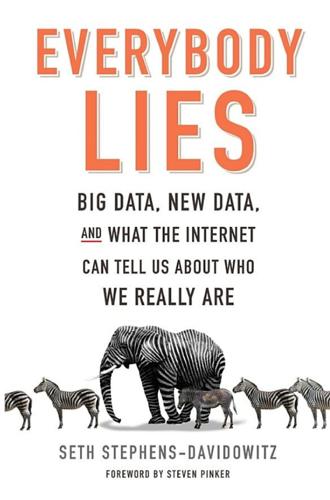Jeff Seder
description: CEO of EQB, known for applying data analytics to the selection of racehorses
2 results

Everybody Lies: Big Data, New Data, and What the Internet Can Tell Us About Who We Really Are
by Seth Stephens-Davidowitz · 8 May 2017 · 337pp · 86,320 words
, however, came from a small firm called EQB. The head of EQB was not an old-school horse man. The head of EQB, instead, was Jeff Seder, an eccentric, Philadelphia-born man with a pile of degrees from Harvard. Zayat had worked with EQB before, so the process was familiar. After a
…
in the suburbs of New York City, American Pharoah became the first horse in more than three decades to win the Triple Crown. What did Jeff Seder know about horse No. 85 that apparently nobody else knew? How did this Harvard man get so good at evaluating horses? I first met up
…
need to worry too much about why your model works exactly as it does. Just get the numbers right. That is the second lesson of Jeff Seder’s horse story. The final lesson to be learned from Seder’s successful attempt to predict a potential Triple Crown winner is that you have
…
to One, Peter Thiel, an early investor in Facebook, says that great businesses are built on secrets, either secrets about nature or secrets about people. Jeff Seder, as discussed in Chapter 3, found the natural secret that left ventricle size predicted horse performance. Google found the natural secret of how powerful the
…
I was learning that many Big Data operations use small data to fill in the holes that I showed up in Ocala, Florida, to meet Jeff Seder. Remember, he was the Harvard-educated horse guru who used lessons learned from a huge dataset to predict the success of American Pharoah. After sharing
…
incorrectly attributes the quote to Seder. It was actually made by another member of his team. 65 I first met up with Seder: I interviewed Jeff Seder and Patty Murray in Ocala, Florida, from June 12, 2015, through June 14, 2015. 66 Roughly one-third: The reasons racehorses fail are rough estimates
…
by Jeff Seder, based on his years in the business. 66 hundreds of horses die: Supplemental Tables of Equine Injury Database Statistics for Thoroughbreds, http://jockeyclub.com/pdfs

Just Keep Buying: Proven Ways to Save Money and Build Your Wealth
by Nick Maggiulli · 15 May 2022 · 287pp · 62,824 words
? And why earlier is better than later B efore american pharoah won the Triple Crown in 2015, no one expected much from the horse. But Jeff Seder felt differently. Seder had worked as an analyst at Citigroup before quitting and following his passion to predict the outcome of horse races. Seder wasn